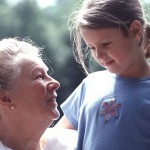During the summer, people often get together with their extended families, offering a great opportunity for  fun, recreation – and gathering elder wisdom!
fun, recreation – and gathering elder wisdom!
Why not use this time to encourage your kids to have meaningful “elder wisdom” conversations with the elders in your family?
Older people are a unique source of advice for living for younger people. And we need to tap this source much more vigorously than we are currently doing — both for young people’s sake and that of our elders.
We often do ask our elders to tell their life stories. But that activity is very different from asking their advice. You don’t just want their reminiscences; what’s truly valuable are the lessons they learned from their experience and that they wish to pass on to younger generations.
So while we are visiting older relatives, why don’t we all take an hour (okay, it can be before or after the trip to the beach) to consult our elders about their lessons for living?
Your children are the best ones to start this conversation and they can ask questions that are highly relevant to them. Is Sammy concerned about bullying? Some elders (especially immigrants) were ferociously bullied as children. Is Pat concerned about finding the right partner? You have elders who have long experience in relationships, but who are rarely asked for their advice about them. Are your college kids worried about the job market? If so, how about advice from people who went through the Great Depression?
Remember that this is different from asking Grandpa “What did you do in World War II?” or Grandma “What was life like in the Depression?” The goal is to genuinely and interestedly ask for advice: “What lessons for living did you learn from those experiences?” Taking this approach elevates the role of elders to what they have been through most of the human experience: counselors and advisers to the less-experienced young.
Give it a try on vacation (and let me know how it went!). Here are some questions to get you started; it can help to send these in advance to your elders so they can ponder them a bit. More information is available in the book 30 Lessons for Living.(and you can watch elders sharing their lessons on our YouTube channel).
- What are some of the most important lessons you feel you have learned over the course of your life?
- Some people say that they have had difficult or stressful experiences but they have learned important lessons from them. Is that true for you? Can you give examples of what you learned?
- As you look back over your life, do you see any “turning points”; that is, a key event or experience that changed over the course of your life or set you on a different track?
- What’s the secret to a happy marriage?
- What are some of the important choices or decisions you made that you have learned from?
- What would you say you know now about living a happy and successful life that you didn’t know when you were twenty?
- What would you say are the major values or principles that you live by?
Add go ahead and add your own. I guarantee it will enrich your summer vacation this year!









